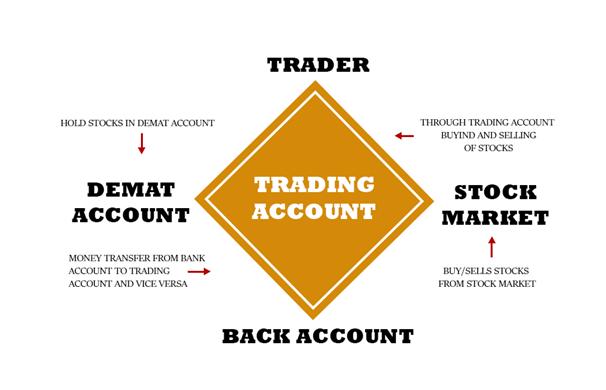Stocks/Share Market |
December 07, 2023What is the difference between Demat and Trading account?
Demat Account
The Demat Account, short for Depository Beneficiary Account, serves as a digital repository for holding securities in dematerialized form. This type of account functions as a centralized location where all securities acquired from the Indian Stock Market are electronically stored.
In a Demat Account, various securities, including bonds, debentures, equity shares, preference shares, or any securities with International Securities Identification Number (ISIN), can be securely held. Notably, securities with ISIN can be accommodated in a Demat Account, irrespective of their listing status on any Stock Exchange. For individuals engaging in the equity segment (cash market) within a Trading Account, it is mandatory to possess a Demat Account.
To open a Demat Account, individuals must approach a Depository Participant (DP) affiliated with either the Central Depository Services Limited (CDSL) or the National Securities Depository Limited (NSDL).
Trading Account
In stock trading, the term "trading account" refers to an instrumental platform enabling investors to engage in the buying and selling of securities. Functioning as a crucial link between you, your bank account, your demat account, and the stock market, the trading account is exclusively dedicated to facilitating trades.
A trading account can only be initiated through a SEBI-registered stock broker and serves a dual purpose, accommodating both trading and investment activities. Securities, such as shares, purchased via a trading account find their storage in the demat account, and when shares are sold through the trading account, they undergo a seamless transfer from the demat account to the Stock Exchange via the stockbroker.

Let us break down the main differences between demat and trading account in the following key points:
Nature:
- Demat Account: Used to store actual and other securities bought in the market.
- Trading Account: Functions like a regular bank account, linking your demat and bank accounts.
Purpose:
- Demat Account: Holds listed and unlisted securities electronically.
- Trading Account: Used to place orders for trading in securities.
Account Opening:
- Demat Account: Any stockbroker who is also a DP (Depository Participant) can open a demat account.
- Trading Account: Any Stock Broker or Broker Member of a recognized Stock Exchange.
Approvals:
- Demat Account: Requires approval from SEBI, NSDL, or CDSL.
- Trading Account: No specific approvals needed.
Multiple Accounts:
- Demat Account: Allows multiple demat accounts with one DP for various purposes.
- Trading Account: Only one trading account can be opened with one Stock Broker.
Suitability:
- Demat Account: For anyone wishing to invest in the stock market and store shares electronically.
- Trading Account: For anyone dealing in both cash and derivative segments.
Role:
- Demat Account: Acts like a bank locker, facilitating the buying and selling of securities.
- Trading Account: Used for placing buy or sell orders.
Modes of Operation:
- Demat Account: Operates electronically through internet login or physical instructions with limited purpose POA (Power of Attorney) from clients.
- Trading Account: Operates online or offline through methods like telephone calls, emails, personal visits, etc.
Annual Charges:
- Demat Account: Varies from Rs. 0 to Rs. 1200 for account opening, and an annual maintenance charge is levied.
- Trading Account: Typically no mandatory charge for the trading account.
In summary, while a Demat Account serves as a secure electronic vault for holding securities, a Trading Account acts as the gateway for actively buying and selling in the stock market. Each has distinct roles, approval requirements, and operational modes, making them essential tools for investors and traders alike. Understanding the demat and trading account difference is crucial for navigating the complexities of the financial landscape.
Author - Findoc